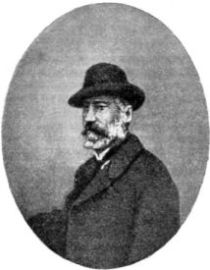Theophil Matwejewitsch Tolstoy
Theophil Matveyevich Tolstoy ( Russian Феофил Матвеевич Толстой ; * June 6 jul. / 18th June 1809 greg. , † February 20 jul. / 4. March 1881 greg. In St. Petersburg ) was a Russian official, composer , music critic and Writer with the pseudonym Rostislav ( Ростислав ).
Life
Tolstoy was the son of Matwei Fyodorowitsch Tolstoy (1772-1815) and his wife Praskowja Mikhailovna Golenishcheva-Kutusowa (1777-1844), daughter of General Prince Mikhail Kutusow . He completed his training in the St. Petersburg Page Corps in 1827. Then he was 1828-1832 civil servant in the budget control office of the Russian Empire .
In addition to his professional work, Tolstoy was musically and literary . He composed more than 200 romances . He took singing lessons from Giovanni Battista Rubini and continued his education in Italy . With an Italian libretto he composed the opera Birichino di Parigi , which was performed in Naples in 1832 and in St. Petersburg in 1835. The opera Doktor w Chlopotach (Doctor in Need) , composed in 1835, was performed in 1851.
In 1836, Tolstoy became senior assistant to the head of the office of the Moscow General Military Governor. In 1841 he was transferred to the Chancellery of the Governor General of Smolensk , Vitebsk and Mogilev . In May 1843 he was appointed chamberlain ( fifth class ). In December 1843 he was transferred to the War Ministry, where he dealt with problems of logistics . In 1848 he became a civil servant for special tasks with the Minister of War. From 1856 he took part in meetings of the provisions department of the War Ministry with voting rights . In 1860 he became Chamberlain and in 1861 Real Councilor of State (fourth class).
After the minor success of his operas, Tolstoy had given up his career as a composer and now devoted himself to music criticism . Since 1850 he wrote in Moskowskije Vedomosti , Journal de St. Petersburg and other magazines. He reviewed the operas A Life for the Tsar (1854) as well as Rogneda (1870), Judith (1871) and Vraschja Sila (The Devil) (1871) by Alexander Serow . He campaigned for the work of Glinka , Dargomyschski and Serow. In 1852 he published in the Sovremennik the narrative Kapitan Toldi and 1859. The Russian Messenger the Roman Bolesni Woli (Will diseases) . He exchanged letters with Nikolai Nekrasov , Fyodor Dostoyevsky and Ivan Goncharov . Count Alexei Tolstoy addressed two humorous epistles of verse to him.
After Dmitri Milyutin's reform of the War Ministry in 1864, Tolstoy became a member of the Council of the Central Press Office in 1865 as Hofmeister (third class) of the imperial court , releasing his duties in the War Ministry . In 1871 he was dismissed from this office and taken back to the War Ministry with release from service.
Tolstoy was married to the singer Alexandra Dmitrijewna Davydowa (1815-1884), daughter of Dmitri Alexandrowitsch Davydows and Princess Jelisaveta Alexejewna Schachowskajas . Count Grigory Stroganow , Count Pyotr Kreiz and Pyotr Albedinsky were frequent guests in her salon . They had a son Alexander (1839-1910), who was court master and high court marshal (second rank).
Tolstoy was buried in the St. Petersburg Nicholas Cemetery of the Alexander Nevsky Monastery .
Tolstoy's older brothers were Major General Pavel Matveyevich Golenishchev-Kutuzov , the General and Director of the Chesmensk Palace, Nikolai Matveyevich Tolstoy, and the diplomat and post minister Ivan Matveyevich Tolstoy .
Honors
- Russian Order of Saint Anne II Class with Imperial Crown (1855)
- Russian Order of Saint Stanislaus II class with imperial crown (1857)
- Order of St. Vladimir III. Class (1859)
- Russian Order of Saint Stanislaus I Class (1863)
- Russian Order of Saint Anne I Class (1868)
- Order of St. Vladimir II Class (1871)
Web links
Individual evidence
- ↑ a b c Brockhaus-Efron : Толстой Феофил Матвеевич (1809–1881)
- ↑ a b В. И. Саитов: Петербургский некрополь, Т. 4 . Типография М. М. Стасюлевича, St. Petersburg 1913, p. 272 ( Толстой, Феофил Матвеевич [accessed August 16, 2017]).
- ↑ a b c Толстой, Феофил Матвеевич. In: Русский биографический словарь . St. Petersburg, Moscow 1918.
- ↑ Ростислав и его письма Некрасову. In: Kornei Tschukowski : Люди и книги . Moscow 1960.
- ↑ Записки графа М. Д. Бутурлина. Т.2 . Русская усадьба, Moscow 2006, p. 59 .
| personal data | |
|---|---|
| SURNAME | Tolstoy, Theophil Matwejewitsch |
| ALTERNATIVE NAMES | Толстой, Феофил Матвеевич (Russian) |
| BRIEF DESCRIPTION | Russian civil servant, composer, music critic and writer |
| DATE OF BIRTH | June 18, 1809 |
| DATE OF DEATH | March 4, 1881 |
| Place of death | St. Petersburg |
